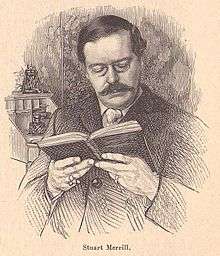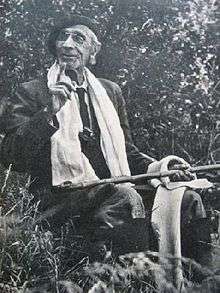Stuart Merrill
Stuart Fitzrandolph Merrill (August 1, 1863 in Hempstead, New York[1] – December 1, 1915 in Versailles, France) was an American poet, who wrote mostly in the French language. He belonged to the Symbolist school. His principal books of poetry were Les Gammes (1887), Les Fastes (1891), and Petits Poèmes d'Automne (1895).

| French literature |
|---|
| by category |
| French literary history |
| French writers |
|
| Portals |
|
Life
.jpg)

Merrill was the product of a conservative, wealthy, Protestant upbringing. In 1866, his father George received a diplomatic appointment to Paris, where Merrill would learn French and live for the next 19 years. Stéphane Mallarmé was one of Merrill's school instructors. His classmates included future symbolists René Ghil and Pierre Quillard. Merrill ran a weekly journal, Le fou, before returning to the States in 1884 to attend law school.[1] On April 15, 1887, Merrill went to Madison Square Theater in New York to hear Walt Whitman give his famous "Death of Abraham Lincoln" lecture. Afterwards, Merrill had the opportunity to meet Whitman, an experience he later recorded in the magazine "Le Masque."[2]
Also in 1887, Merrill published his first book of poems, Les gammes, in Paris, and received wide critical acclaim in Europe. As his literary career took off he participated in radical political causes, siding with the anarchists in the famous Haymarket riots. When George Bernard Shaw attempted to circulate a petition in London calling for the release of Oscar Wilde, imprisoned for homosexuality, Merrill made a similar attempt to get notable artists and intellectuals to sign a similar petition in the United States. Although Merrill's father disinherited him for his politics, his mother would continue to support him financially throughout his life.[1]
In 1890, Merrill published Pastels in Prose, a collection of his translations of French prose poems. This was his only book ever to be published in America. The same year, he returned to Europe permanently and he married in 1891. For the years 1893–1908, his address was 53 Quai de Bourbon, Île Saint-Louis, Paris. Several more books, including Les fastes in 1891 and Petits poèmes d’automne in 1895,[1] were published before his death of heart disease in 1915. In 1927 a small traffic way in the 17th arrondissement of Paris took the name Place Stuart-Merrill.
Works
- Les gammes (The Ranges), Vanier, Paris, 1887
- Pastels en Prose, Harper & Brothers, New York, 1890
- Les Fastes (The Record), 1891
- Petits Poèmes d'Automne (Little Autumnal Poems), 1895
- Les quatre saisons (The Four Seasons), Mercure de France, Paris, 1900
- Walt Whitman, Henry S. Saunders, 1922
- Prose et vers : œuvres posthumes (Prose and Verse: Posthumous Works), A. Messein, Paris, 1925
- The White Tomb: Selected Writing, Talisman House, 1999
References
- Qureshi, Ramez. "Ramez Qureshi on Stuart Merrill's The White Tomb: Selected Writing". Retrieved 2007-09-12.
- Stuart Merrill, Walt Whitman (Toronto: Henry S. Saunders, 1922)
External links
| Wikimedia Commons has media related to Stuart Merrill. |
| Wikiquote has quotations related to: Stuart Merrill |
| French Wikisource has original text related to this article: |
- Works by Stuart Merrill at Project Gutenberg
- Works by or about Stuart Merrill at Internet Archive
- Works by Stuart Merrill at LibriVox (public domain audiobooks)

- Poems by Stuart Merrill
- Selected poems (in French)
- Stuart Merrill at Library of Congress Authorities, with 2 catalog records